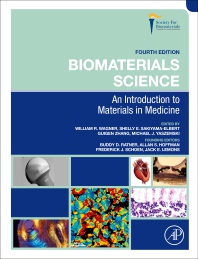
William R. Wagner, Ph.D.
AIMBE College of Fellows Class of 2000 For outstanding contribution in the field of cardiovascular biomaterials and the assessment of cardiovascular device biocompatibility.
Biomaterials Science, 4th Edition
Via Society For Biomaterials | March 1, 2020 Editors:
Editors:
- William Wagner, PhD
- Shelly Sakiyama-Elbert, PhD
- Guigen Zhang, PhD
- Michael J. Yaszemski, MD, PhD
Founding Editors:
- Buddy Ratner, PhD
- Allan Hoffman, ScD
- Frederick Schoen, MD, PhD
- Jack Lemons, PhD
Description
Biomaterials Science: An Introduction to Materials in Medicine, Fourth Edition, is the most comprehensive text on biomaterials science, from principles to applications. It provides a balanced, insightful approach to both the learning of the science and technology of biomaterials, acting as a key reference for practitioners involved in the applications of materials in medicine. In this new edition, there are key updates to reflect the latest relevant research in the field, particularly in applications in nanotechnology, robotic implantation, and biomaterials utilized in cancer research detection and therapy. Other additions include regenerative engineering, 3D printing, personalized medicine and organs on a chip.
Based on customer feedback, the new edition also features a consolidation of redundant material to ensure clarity and focus. Where appropriate, end-of-chapter exercises have been included with online solutions available… Learn more.
Wagner Named Fellow of NAI
Via Pitt Chronicle | January 11, 2017With 17 patents and more than 40 invention disclosures to his name, University of Pittsburgh professor William Wagner has been named a Fellow of the National Academy of Inventors (NAI). According to the NAI, the honor is “the highest professional distinction accorded solely to academic inventors who have demonstrated a prolific spirit of innovation in creating or facilitating outstanding inventions that have made a tangible impact on quality of life, economic development, and the welfare of society.”In addition to serving as director of Pitt’s McGowan Institute for Regenerative Medicine, Wagner is a professor of surgery, bioengineering, and chemical engineering. He also serves as chairman of the Tissue Engineering and Regenerative Medicine International Society-Americas, deputy director of the NSF Engineering Research Center for Revolutionizing Metallic Biomaterials, and chief scientific officer of the Armed Forces Institute of Regenerative Medicine. Wagner is the third Pitt faculty member to be named an NAI Fellow.
Creating Medical Devices with Dissolving Metal
Via Pitt Chronicle | December 8, 2014University of Pittsburgh researchers recently received another $1.5 million from the National Science Foundation to continue a combined multi-university, private-industry effort to develop implantable medical devices made from biodegradable metals.
Body-degradable metals—usually magnesium based—are not new, having been originally considered in the late 19th century. But, says Pitt’s William Wagner, deputy director of the project and a principal investigator, “the question comes when you start to design medical devices for a specific application, and a clinical partner says, ‘We want that to be gone in a month, or a month-and-a-half, or we want that to be there for a year.’” Then you have to figure out how to meet those specifications, he says.
To that end, the Pitt team as well as collaborators at the University of Cincinnati (UC) and North Carolina Agricultural and Technical State University (N.C. A&T) are creating new alloys and new manufacturing processes that suit clinical demands. The consortium seeks to design devices that can adapt to changes in a patient’s body and dissolve once healing has occurred, reducing follow-up procedures and potential medical complications and sparing millions of patients worldwide added pain and medical expenses.
Thus far, the consortium has created novel screws and plates for facial reconstruction, a stent to be used in kidney dialysis, a nerve guide, and a ring that will assist in pulling together and healing ruptured ligaments. The group has also created a tracheal stent for pediatric patients whose tracheas are underdeveloped at birth and prone to collapse. Once the stent is implanted, Wagner—director of Pitt’s McGowan Institute for Regenerative Medicine and professor of surgery, bioengineering, and chemical engineering in the School of Medicine and Swanson School of Engineering—says it would dissolve, obviating the need for a second procedure on the young patient.
Pitt’s Dr. William Wagner to Receive 2013 Senior Scientist Award from TERMIS-AM
Via University of Pittsburgh Engineering | July 22, 2013William Wagner, PhD will receive the 2013 Senior Scientist Award during the 2013 Tissue Engineering Regenerative Medicine International Society (TERMIS-AM) conference this November in Atlanta.
Dr. Wagner is Director of the McGowan Institute for Regenerative Medicine and Professor of Surgery, Bioengineering and Chemical Engineering at Pitt. He is a tremendous colleague and outstanding scholar, as well as Founding Editor and Editor-in-Chief of one our field’s leading journals, Acta Biomaterialia.
Engineers Aim to Green the O.R. and Pitt Researcher Recognized For Melding Body and Machine | University of Pittsburgh News
Via University of Pittsburgh News | May 5, 2011The country’s foremost scientific organization for biomaterials has honored William Wagner, a professor of surgery, bioengineering, and chemical engineering in Pitt’s Swanson School of Engineering, for his work developing medical technology that functions in synchronicity with the body.
The Society for Biomaterials presented Wagner with the 2011 Clemson Award for Applied Research, which recognizes the application of basic science to a significant accomplishment in biomaterials. Wagner, who also is deputy director of Pitt’s McGowan Institute for Regenerative Medicine (MIRM), is known for his work developing technology to treat and diagnose cardiovascular disease, particularly devices that help patients during heart failure. The award includes a $1,000 prize.
 AIMBE
AIMBE
